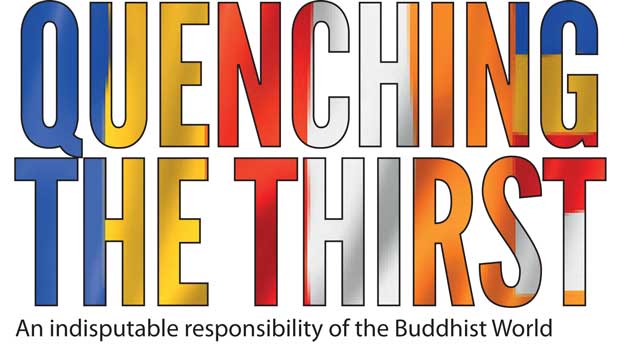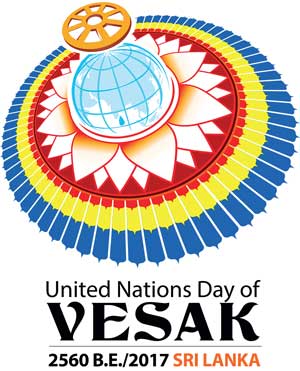Reply To:
Name - Reply Comment
Last Updated : 2024-04-19 21:46:00

 Since the beginning of the 21st century there have been many developments, both positive and negative, for human well-being. The many advances in science and technology have opened many portals of knowledge that seemingly should bring about a safe world that could enable the highest potential of a human being to blossom. However, the opposite seems to be happening.
Since the beginning of the 21st century there have been many developments, both positive and negative, for human well-being. The many advances in science and technology have opened many portals of knowledge that seemingly should bring about a safe world that could enable the highest potential of a human being to blossom. However, the opposite seems to be happening.
There is much tension even in those countries that enjoy high human development indices. Humans are killing humans, poor nations are being plundered of their natural resources to satisfy the insatiable thirst for power both economically and politically, human trafficking has reached inconceivable proportions to satisfy human lust, narcotic drugs and alcohol are ruining human dignity and disrupting the social fabric and family life. Disparities between rich and poor nations and within a nation, the gap between the rich and the poor, are widening, which portend dire consequences. Globally, too, climatic changes, mainly due to greenhouse effects of human ‘development’, are creating havoc because of unpredictability of climatic changes impacting on agriculture and life in general. The UN as a world body is trying its best to grapple with these issues. The Environmental Summits, Millennium Development Goals followed by Sustainable Development Goals, WHO Framework Convention on Tobacco Control followed by a UN Summit on Non-Communicable Diseases are major steps forward. However, it is becoming increasingly clear, that there has to be a paradigm shift in thinking for the very survival of humankind and that the possible answer could be found in Buddhist thought and practice.

A study conducted recently in England and Wales by St. Mary’s Catholic University in Twickenham has concluded that ‘people with no religion exceed Christians’.[i] The report states “In 2014, 48.5 per cent of people said that they had no religion – or were ‘nones’ – compared to 43.5 per cent of people who identified as Christians – Anglicans, Catholics and other denominations. The percentage of “nones” has almost doubled from 2011, when 25 per cent of people referred to themselves as having no religion.”[ii] This is a trend in the Western world and also emerging in countries like Japan and China. Recently the first chair of atheism studies was established at the University of Miami.[iii] These are clear indications that the peoples in the world are becoming rudderless and that there is a large spiritual vacuum to be filled for the welfare and happiness of humankind.
Although the world climate is extremely promising for the spread of the teachings of the Buddha for human happiness and the time is ripe, there are many trends, some of which are disturbing, that need to be watched. A question that needs to be raised is as to whether Buddhist communities throughout the world are getting ready to benefit from the opportunities arisen to spread the word of the Buddha for the welfare and happiness of many. In the Buddha Dhamma, the Buddhist world has a ‘Product’ (apologies for using a modern marketing term) which is excellent in the middle, and excellent in the end with an assurance of peace, social justice and non-harm to others. It is nothing but human that no organisation will like to lose its hold and will use every overt and covert means to destabilise a contending force. The Buddhists have to accept this reality and learn from the life of the Buddha and the way he faced the opposition there was from the established order during his time.
Buddhism is not a militant religion. Conversions by coercion or by use of force or by taking advantage of a crisis situation of a person or family are against Buddhist norms. This is amply testified in studying the spread of the Buddha’s teaching throughout history. ‘Open are the doors to the Deathless; let those who have ears repose trust.’[iv] This was the clarion call of the Buddha, who we should remember gained enlightenment on the full-moon day of Vesak two thousand six hundred and six years ago by his own effort. His was the highest achievable mental development any human being could reach. During his dispensation of 45 years, the Buddha, whilst leading an exemplary life himself, went on foot throughout the length and breadth of Northern India with his disciples, who too led exemplary lives, explaining his new found knowledge out of compassion, for the welfare and happiness of humankind (bahujana hitāya bahujana sukhāya[v]).
The Buddha was confident of himself, his teachings, and his disciples. He was a peerless trainer of persons and during the first rain retreat at Isipatana in Benarese, he thoroughly coached his first 60 disciples so that he could say with confidence that when setting forth to make known the new teaching, no two of his disciples should go the same way[vi]. He was keen to make known his new knowledge not to increase numbers but out of compassion to show a way to happiness in this and the other world and to end sansaric woes.
As a vehicle of imparting his noble teaching he used the language of the common man. Sanskrit was the language of the Vedas, of the elite, and the learned. He eschewed using that language because he wanted his message to reach out to everyone. There are six languages currently recognized by the United Nations – English, French, Russian, Chinese, Spanish and Arabic. There are plenty of books on Buddhism in the English language; but how few are the books in other languages. Coming closer, India and China have over a third of the world’s population. Is the Buddhist world adequately geared to reach out to the people even in these two countries? In the Western world the number of ‘nones’ or atheists, as mentioned earlier, are on the increase. What plans does the Buddhist world have to help them? Could the social media be used more effectively to reach them?
Although the Buddhists seem to be slumbering and even working defensively, the Church is preparing itself for the changes of the 21st century by a two-pronged strategy. Firstly, by unifying the Church with the lead role taken by Pope Francis, the head of the Roman Catholic fraternity, and secondly, by harvesting new ‘souls’ by a long term vision of making Asia Christian or believers of God by the end of the third Millennium. This is what Paul Hattaway, the International Director of Asia Harvest has to say. “In the past 20 years, Christians around the world have launched initiatives to reach Muslims, Communists, Hindus and other major unreached people groups but the Buddhist world has largely been overlooked. Hundreds of millions of Buddhists continue to live and die without any exposure to the Gospel.”[vii]
Conversions to Christianity in the traditional Buddhist countries is a challenge that Buddhists cannot ignore anymore when considering the happenings in South Korea, Mongolia, China, Singapore, Sri Lanka, Myanmar, Vietnam and other countries with a majority or significant Buddhist population. What strategies have the Buddhist world developed to counteract these insidious intrusions without dissipating its energy only on this and failing to see the bigger landscape and the vast opportunities out there? Also, learning from each other, what actions need to be taken to empower the Buddhists in the traditional Buddhist countries so that they could politely say ‘NO’ to the evangelists? History has shown that aggressive methods are not long lasting.
The Buddhist World should ask why in Human Rights issues there are double standards by the Western World, for example, in respect of Rosangya Muslims in Myanmar and the Chakma Buddhists in Bangladesh. Whilst the former is considered a hot spot, the latter has not received adequate attention and was hardly reported in the Media. Buddhists have not fought wars to propagate their faith and in a Buddhist regime non Buddhists have no restrictions to observe their religions unhindered. However, why is the Western World interested in forcing secularism into the constitutions of Buddhist countries?
Sri Lanka has an experience of 450 years of Christian rule and the Buddhists had to face torture under the Portuguese, and much discrimination in education, employment, land ownership etc. under the Dutch and the British. However, it is a credit to the stamina of the Sri Lankan Buddhists that only 6-7% have changed their faith. Now more subtle methods are used to disintegrate the Buddhists and divide the clergy. There are many internal challenges that the Buddhists in Sri Lanka are facing. These have been identified in Commission reports and remedial actions recommended. However, these reports are gathering dust with no or little action taken. Why? Similarly, the Buddhists of every country may be facing internal hardships or challenges and there could be many commonalities for collective action by the Buddhist world. The Buddhists should feel empowered to serve humanity out of compassion and love (sabba pāna bhūta hitānukampī).
This year (2017) the UN Vesak day is celebrated in Sri Lanka. Recognition of Vesak day by the UN, in this manner, was largely due to the efforts of Sri Lanka based on a resolution passed at the World Buddhist Conference held in Sri Lanka in 1998. In the message of the former UN Secretary General Ban-ki-Moon to the 2016 Vesak Day celebrations he has stated, ‘As the United Nations works for the adaption this year of a set of new sustainable development goals and a meaningful new agreement on climate change, we would do well to heed the Buddhist teaching that life and the environment are essentially one.’[viii]If that be so, due recognition has to be given to Buddhism by elevating the status of recognition of the day of Vesak. It is timely that a resolution be passed to make the day of Vesak an official holiday by the United Nations.[ix] This could be the first step. The Buddhist world should plan and implement programmes keeping in mind the words of the Buddha that the ‘Dhamma and Discipline proclaimed by the Buddha shine when exposed, not when concealed’.

Add comment
Comments will be edited (grammar, spelling and slang) and authorized at the discretion of Daily Mirror online. The website also has the right not to publish selected comments.
Reply To:
Name - Reply Comment
On March 26, a couple arriving from Thailand was arrested with 88 live animal
According to villagers from Naula-Moragolla out of 105 families 80 can afford
Is the situation in Sri Lanka so grim that locals harbour hope that they coul
A recent post on social media revealed that three purple-faced langurs near t